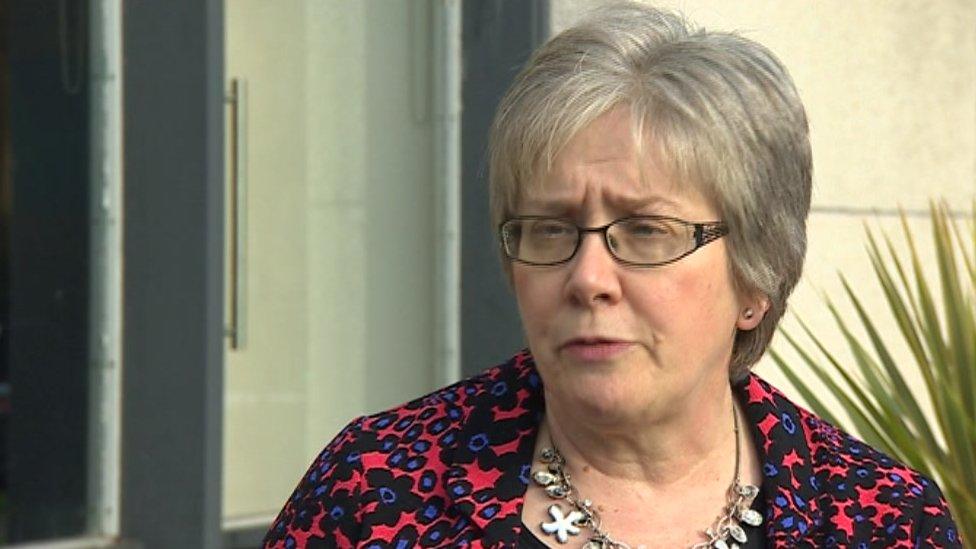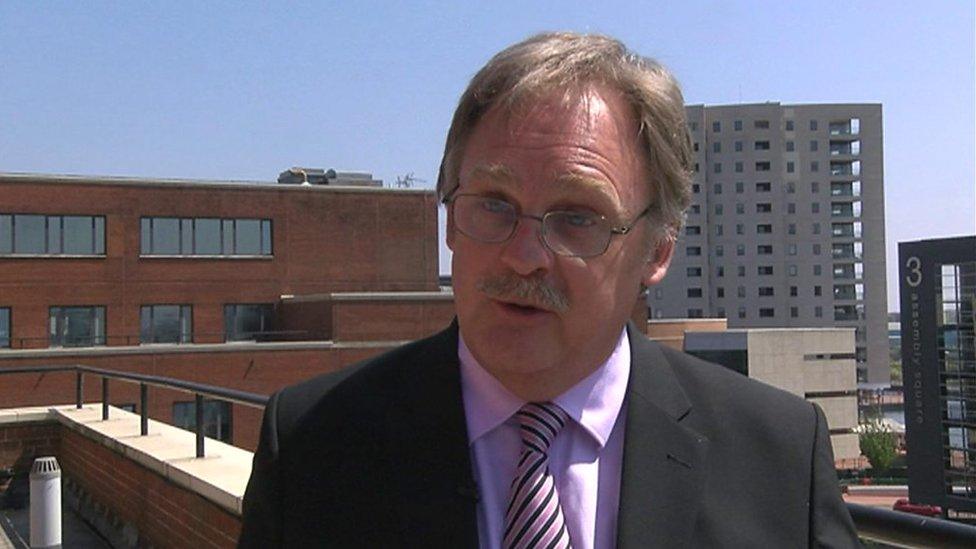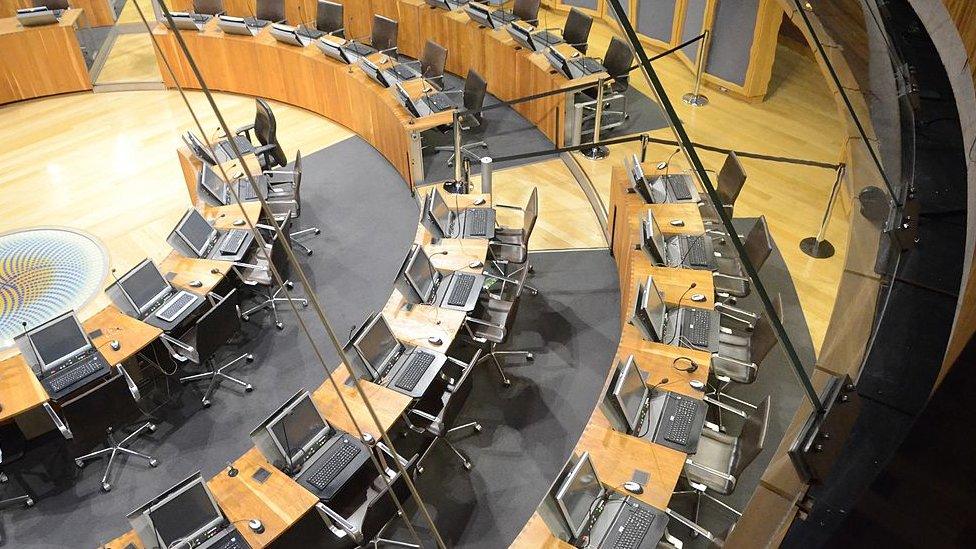Bevan Foundation: £6,500 Senedd cash pays members' think tank fees
- Published

The Bevan Foundation takes its name from Aneurin Bevan, founder of the NHS
Five Welsh government ministers are among 13 Members of the Senedd (MSs) who have paid for their current annual subscription to the Bevan Foundation think tank from public money.
Ten Labour, two Plaid Cymru and one Conservative MSs have used public funds, totalling £6,495.
MSs already have a Senedd research service while ministers are advised by the Welsh government civil service.
The Bevan Foundation says its findings are often quoted in Senedd debates.
There is no suggestion that the MSs have broken any rules.
The Senedd Labour Party group says the subscriptions "help to inform" parliamentary and constituency work, while Plaid Cymru said the foundation's "valuable work on poverty and childcare is very useful".
Former ITV political commentator Gareth Hughes said "it's up to the MSs what they subscribe to, but they should pay for it themselves not claim from the taxpayer".
'Influential'
The Bevan Foundation, based in Merthyr Tydfil, says it aims "to create insights, ideas and impact that end poverty and inequality".
It describes itself as "Wales' most influential think tank" and subscribers receive "exclusive benefits" including "the latest facts and figures in our regular State of Wales briefings", a copy of its magazine, and "invitations to get involved in our topical round-table discussions".

Dr Victoria Winckler is the director of the Bevan Foundation
The annual cost is £528 including VAT (the Senedd Commission, which is in charge of the day-to-day running of the Welsh Parliament, does not recover the VAT from HMRC), although some Senedd members' expenses cover a slightly shorter bill period this year.
MSs already have access to the Senedd research service, which provides them with confidential answers to questions relating to their work, a library of publications and electronic resources as well as policy briefings and advice on public finance, budgets and statistics.
Among the Labour MSs claiming the money for their current subscription are Wales' most senior legal advisor, Counsel General Mick Antoniw; Deputy Minister for Arts, Sport and Tourism Dawn Bowden; Economy Minister Vaughan Gething, Education Minister Jeremy Miles and Health Minister Eluned Morgan.
The other Labour MSs to do so were Mike Hedges, Hefin David, Vikki Howells, Jenny Rathbone and Joyce Watson.
Former deputy leader Siân Gwenllian is one of two Plaid Cymru MSs claiming the subscription; the other was Sioned Williams.
The only Conservative subscriber to claim the money is Mark Isherwood, who represents north Wales and chairs the Senedd's Public Accounts and Public Administration Committee.
The Welsh Conservatives and Mr Isherwood were invited to comment.
'Deep burning hatred'
The Bevan Foundation takes its name from Aneurin Bevan, founder of the NHS, "because of a shared commitment to social justice, although the Foundation is firmly non-partisan".
During a speech marking the creation of the NHS in 1948 Bevan, the then Labour health minister, spoke of his "deep burning hatred" for the Conservative Party, saying that "so far as I am concerned they are lower than vermin".

Mark Isherwood is the only Conservative to reclaim the money
Dr Victoria Winckler, who has been the director of the Bevan Foundation since 2002, said "more than 100 organisations of many different kinds and sizes have a subscription - we assume because they find it useful.
"The offices of Senedd members of all parties clearly do find a subscription of benefit to their work, as evidenced in the many times our findings are quoted in Senedd debates.
"As a purchased, optional service, allowable by the Senedd Commission, it is in our view a reasonable use of public funds."
In addition, one Labour MS claimed £250 for membership of the Institute of Welsh Affairs think tank on expenses.

What is a think tank?
The Oxford English Dictionary defines a think tank as "a research institute or other organisation providing advice and ideas on national or commercial problems", having made its debut in 1959.
The term think tank was used during World War II to describe a safe place where plans and strategies could be discussed.
In Britain the idea of independent bodies of thinkers able to contribute to public life goes back at least until the 1830s and the Duke of Wellington's part in the founding of the Royal United Services Institution. The Labour-affiliated Fabian Society was another early think tank, founded in 1884.
There are now many, with names including "centre", "institute", "society", "foundation" or "forum" usually accompanied by a "policy", "justice", "social", "studies" or "research".

Members' pay and allowances are set by an Independent Remuneration Board, and the Senedd Commission administers the allowances set by the board.
A Senedd Commission spokesperson said: "The board allows MSs to claim for reasonable costs for running an office and engaging with constituents. These funds may be used for research into policy development, exploration of issues for constituents, and scrutiny of policy, legislation or finance.
"Each MS decides how best to perform their duties and what their allowances should be spent on."
A spokesperson for the Senedd Labour Party Group said: "These subscriptions have been claimed in accordance with Senedd rules and have been approved by the Senedd Commission.
"The subscriptions provide members and their staff with research on a range of issues which helps to inform their parliamentary and constituency work."
'Develop solutions'
A Plaid Cymru spokesperson said the party's "priority is to end poverty in Wales once and for all. The detailed and incisive work of the Bevan Foundation is essential to be able to develop the solutions needed to achieve that ambition.
"The individual office costs of some Plaid Cymru members pay for a subscription to the work of the Bevan Foundation as the work of the organization is key to helping our members try to improve the lives of their constituents.
"Their valuable work on poverty and childcare is very useful to Plaid Cymru and its staff when preparing for their work in the Senedd."
Related topics
- Published27 November 2023

- Published1 June 2022

- Published12 May 2022
